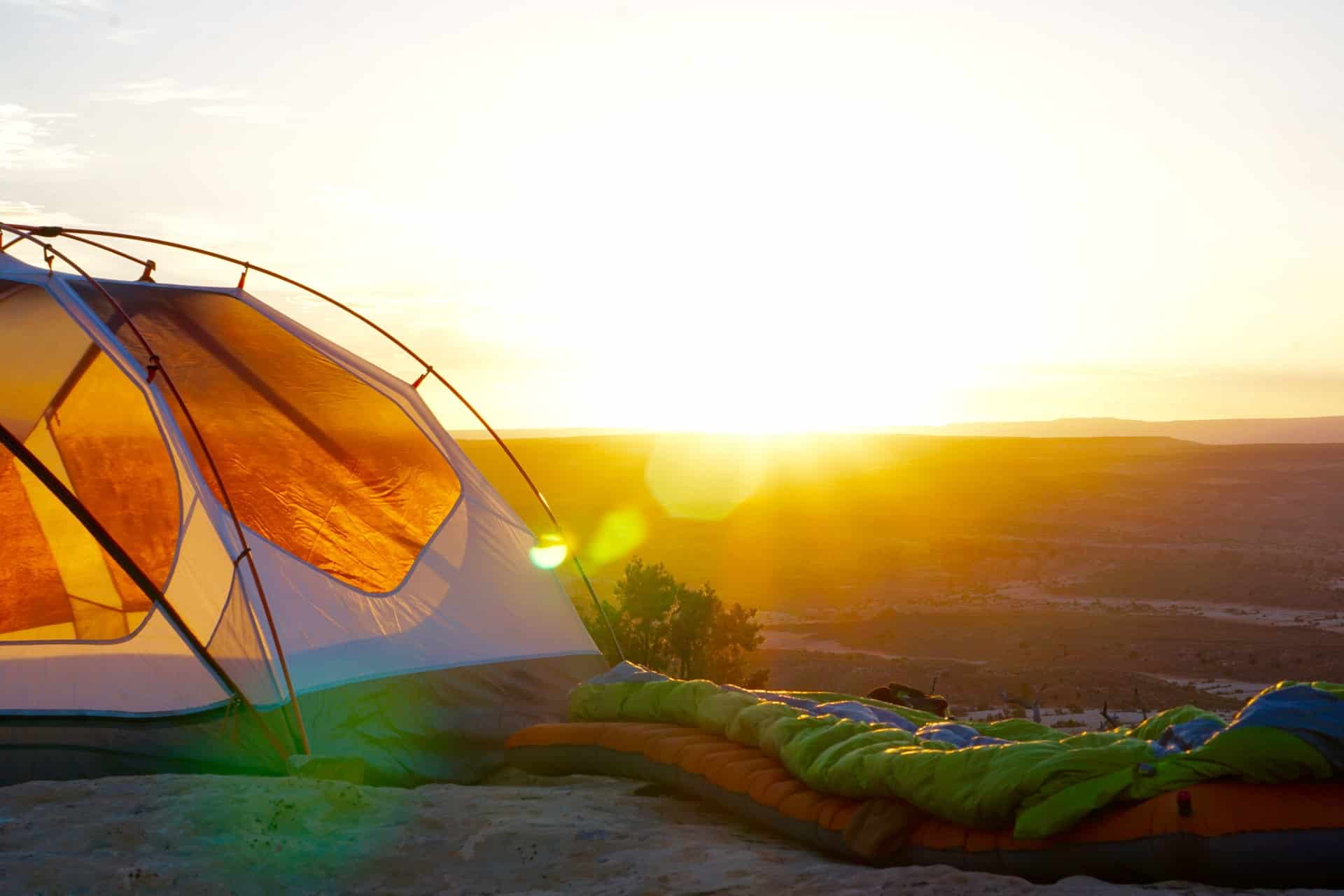Sleep is important, and not just when you’re resting in your bed at home.
Are you looking to find the perfect sleeping surface that will keep you comfortable all night long while you’re camping or hiking in the wilderness?
Backing, hiking, and camping are all highly physical activities that can leave you worn out at the end of a fun, but a long, day.
Many outdoor enthusiasts rave about cots and sleeping pads, but which one will give you the best night’s sleep?
Sleeping pads and cots share some similarities, but their differences really set them apart. Deciding on which sleeping surface you should bring with you will mostly depend on the circumstances of your camping or hiking trip.
Read on to learn more about sleeping pads vs cots so you can determine which product will give you the best night’s sleep during your outdoor adventures.
What is A Camping Cot?
Camping cots are designed to get you up off the ground and provide a safe and stable place for you to sleep. Some come with sleeping pads, but most camping cots don’t.
Camping cots are usually made of tough nylon or polyester material that can hold your weight and provide some stability. The frames are often made of durable materials such as aluminum.
Camping cots have been around for ages, and the first camping cot is believed to have been used by King Tut in Egypt.
This piece of equipment is truly time-tested. Cots were frequently used by soldiers during wartime before being repurposed for recreational campers.
What is A Sleeping Pad?
A sleeping pad is a long piece of material that you can roll up and attach to your pack, which makes it a great option for hikers. Sleeping pads generally come in 3 different forms; inflatable, self-inflatable, and closed-cell foam.
Sleeping pads have also been around for quite some time, and the first inflatable sleeping pad was developed in 1971 by Jim Lea.
They’ve become a very popular item for backpackers because of their low weight and easy setup.
Are Cots Comfortable to Sleep On?
One draw of camping cots is that they come in many shapes and sizes. The sturdy frames will help hold more bodyweight than an inflatable sleeping pad would.
It’s easy to find a cot that will suit your body type, whether you’re a fit backpacker or an average joe trying to enjoy camping while fat.Some camping cots will come with a pad, but not all do.
If you buy a camping cot without a sleeping pad, then you’re going to want to bring along a sleeping bag or thick blanket to lie on. You may be in for an uncomfortable night’s sleep if you don’t.
The pads that come with camping cots are often made of durable yet soft materials such as cotton. The pad will have an exterior shell made of nylon or polyester so that your pad doesn’t get damaged and is easily cleaned.
Camping cots also get you up off the hard, cold ground.
With just the comfort of the cots’ padding and your own pillow and blankets, sleeping in a cot can feel just as comfortable as sleeping in your bed at home.
Are Sleeping Pads Comfortable to Sleep On?
Sleeping pads can be comfortable to sleep on. It all depends on the thickness of the pad and the insulation it provides you.
Placing a sleeping pad straight on the hard ground can be uncomfortable if the pad you’ve chosen is made of thin materials.
The sleeping pads that will provide you with the most comfort are the inflatable ones. These are great because you can adjust the firmness of the pad to suit your preference by simply adding or releasing air.

There are also self-inflating sleeping pads that use a combination of air and closed-cell insulation to keep you comfortable.
This can be a great option because you don’t have to worry about carrying an air pump around with you, and you’ll still find it reasonably comfortable.
Another common type of sleeping pad is just made of closed-cell foam. It’s thin, lightweight, and easy to set up because all you have to do is unroll it and place it on the ground.
These can be a good option if you’re doing a thru-hike or plan on backpacking for a long period of time.
Sleeping pads made of closed-cell foam are going to be the least comfortable because they’re much thinner than the other options and don’t provide you with much insulation from the ground.
Pros and Cons of Using a Cot
A great way to solve the cot vs sleeping pad debate is by looking at the pros and cons of using each product. Cots have a lot of benefits, but there are some downsides to this piece of equipment as well.
Pros
- Simple to set up and put away
- Keeps you off the ground
- Comes in many different sizes
- More durable than a sleeping pad
- Creates storage room for gear underneath it
- Suitable for all weather
Cons
- Heavy frames aren’t suitable for backpackers and hikers
- May need to bring a sleeping pad or sleeping bag to use with your cot
- Cots are more expensive than other options
- More time-consuming to assemble/disassemble
There may be more pros than cons for using a sleeping cot, but much of the deciding factor for whether using a cot is worth it is situational.
If you’re driving up to your campsite and don’t have to worry about lugging a heavy cot around, then they can be a great choice!
However, if you’re planning on going backpacking or hiking, then carrying all the extra weight of a camping cot’s frame wouldn’t be realistic.
Pros and Cons of Using a Sleeping Pad
A lot of campers and backpackers rely on sleeping pads to give them a good night’s rest. But, are they better than camping cots? Let’s look at the pros and cons of this product to find out.
Pros
- Lightweight
- Easy to roll out/roll up
- Compact when rolled up
- Durable
- Affordable
- Customize firmness with the inflatable sleeping pads
Cons
- Need to carry an air pump for inflatable sleeping pads
- Sleeping on the ground
- Won’t last as long as a sleeping cot
- Will need to be cleaned more often since it’s touching the ground
Which Should You Choose?
Sleeping pads and camping cots are both great products, but choosing which one will suit your needs the best really depends on the situation. Here’s a small table that can help you determine which product is best for your outdoor adventure.
|
Situation |
Sleeping Pad |
Camping Cot |
|
All weather conditions |
|
|
|
Car camping |
|
|
|
Backpacking |
|
|
|
Hiking |
|
|
|
Casual Camping |
|
|
|
Festivals/Outdoor events |
|
|
As you can see from the table above, sleeping pads are incredibly versatile and can be used in almost every situation.
Camping cots, however, can only be used in certain situations because of their size and weight.
It’s unreasonable to try to carry a 30lb camping cot with you on a backpacking trip or thru-hike. However, if you’re driving up to your campsite or sleeping outdoors for a festival, then camping cots are an excellent choice.
Can You Sleep On A Camping Cot By Itself?
The majority of camping cots don’t come with padding, so you may be wondering if you can sleep on these without bringing any extra bedding along. Technically, you could sleep straight on the camping cot, but it wouldn’t be comfortable.
Camping cots without padding have a surface made out of nylon or polyester that you could lie on.
The material isn’t going to be thick enough to provide you with much comfort, and unless it’s the middle of summer and very warm, you’re likely to get chilly laying there.
When using a camping cot, you need to bring along a sleeping pad, sleeping bag, or blankets. You can place these items on your cot and bed down for a good night’s rest.
Can You Sleep On A Sleeping Pad By Itself?
Sleeping pads provide cushioning, insulation from the ground, and are comfortable to sleep on by itself. However, you’re going to want to bring along a blanket or sleeping bag if you’re going to be using a sleeping pad in cold weather.
Just like a camping cot, sleeping pads provide you with a surface to sleep on, but you’ll need more than that to be fully comfortable and warm.
Wrapping yourself in a blanket or sleeping bag will get you warm and comfortable all night long.
Which Is Better To Use in a Tent?
Sleeping pads and cots can both be used in a tent, but it’ll largely depend on the size of the tent.
If you’re using an ultra-light single-person tent that doesn’t have much room, then a cot isn’t likely to fit comfortably and a sleeping pad would be a better choice.
However, if you’re staying in a large multi-person tent, then a camping cot would be an excellent choice.
It’ll help get you off the ground and you can even store some of your gear underneath it.
Similarities & Differences
Camping cots and sleeping pads have a lot in common. They both provide you with a safe surface to sleep on, and they’re both designed to be easy to assemble and put away.
Sleeping pads and camping cots are both suitable for all weather conditions and are made of durable materials that will increase their lifespan.
They’re also easy to clean, which is important when looking for something that will be used outdoors.
There are many differences between cots and sleeping pads as well. Cots will get you off the ground and come with a strong aluminum frame.
Camping cots will weigh much more than sleeping pads and aren’t suitable for carrying while backpacking or hiking long term.
Sleeping pads are much lighter than cots, and don’t come with a frame or any extra materials. This makes them a good choice for long hikes or backpacking trips. They’re also made of different materials than cots.
Cots are usually made of polyester and nylon, while their frames are most commonly aluminum. Sleeping pads are usually made of closed-cell foam, which will provide some cushioning and comfort.
Inflatable sleeping pads will be made with some polyester or nylon as well so the fabric can easily inflate and deflate.
The Verdict- Which Is Better?
Camping cots and sleeping pads are both great options when going camping. The one you bring with you will really depend on your situation.
Camping cots are great for casual camping or outdoor festivals, but they aren’t great for long backpacking and hiking trips.
For this one reason, sleeping pads are better than camping cots. They can be used anywhere and everywhere- even car camping.
They’re safe to use in all weather conditions and they’ll provide you with the comfort you need.
For more guides read my other posts:
- Best Sleeping Pad For Side Sleepers
- Best Camping Bed For Bad Back
- Tent Security: 12 Tips to Stay Safe While Camping
- How To Stay Warm On an Air Mattress
About the Author

Hussain is a passionate hiker and traveler that love the outdoor and enjoys what nature has to give, whenever he can he love to write and give tips & honest reviews to help others get out there and just seek more unforgettable experiences.

